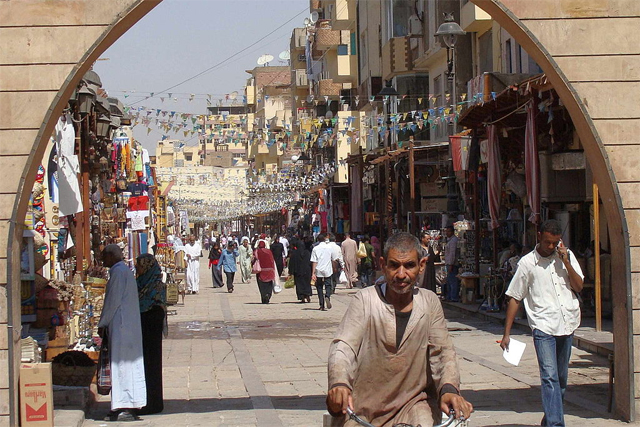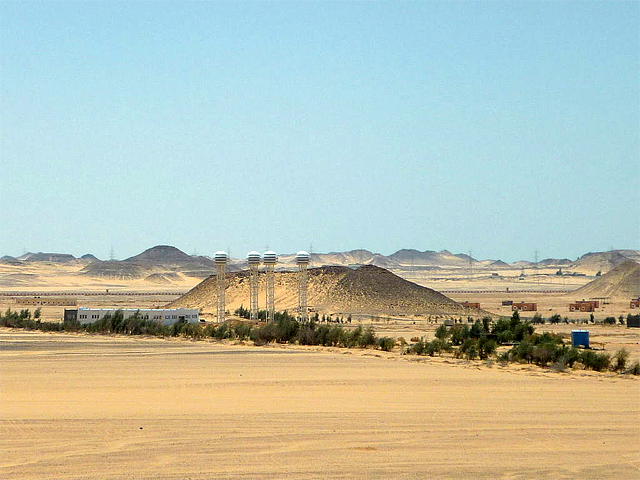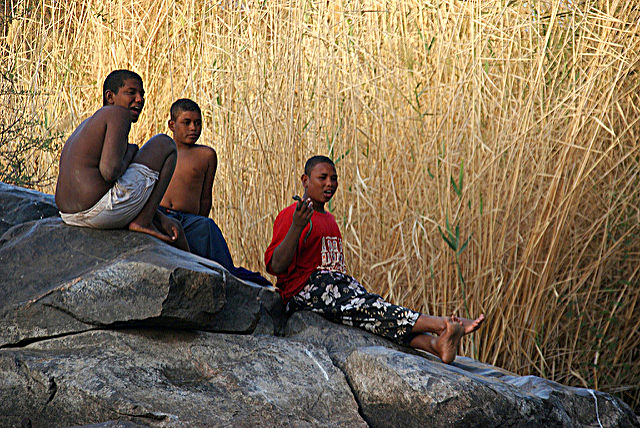Two weekends ago, Nubian activists launched a protest action in Aswan against what they see as the marginalizing and racist policies perpetrated by the Egyptian government. An article by Aurora Ellis in a Middle East news service analyzed in detail the growing concerns of the Nubians, particularly their young people, and their demands for a right of return to their land.

The Nubians gathered in their resettlement villages north of Aswan and traveled in micro-buses into the city to begin their protest march. The protest organizers, led by Mohamed Azmy, a prominent Nubian lawyer and head of the Nubian Union in Aswan, planned to then go on to the Toshka Project in the desert. The protest was stopped by government security agents, however, who confiscated the identification cards of the marchers at a checkpoint.
The Nubians were specifically protesting plans by the government to sell what they consider to be their ancestral lands to other Egyptians. “This land was originally ours and this is our constitutional right and the state can’t sell us our land,” Mr. Azmy told Ms. Ellis. By the evening of the aborted march, President Sisi had responded to the agitation that day. He assured the Egyptian Nubians that the priority of the government in the effort to make the desert bloom would be more lands for the Nubian people.
The leaders of the protest were not impressed. Mr. Azmy said that the government had responded quickly because of press coverage of the march. He saw the events of the day as a standoff between the protesters and the state. “It was an attempt to keep us quiet,” he concluded.

Ms. Ellis interviewed Seham Osman, a member of the Nubian Union, about the protest. Ms. Osman complained that, despite all the promises by the government about Nubian rights, they really don’t respond to legitimate concerns. She emphasized that it is essential for the people to preserve their historic lands. While she admitted that participation by women in the protest was sparse, she said that Nubian women are leaders in the Right of Return movement. The reason is that it is an issue that very much affects many Nubian families.
Yahia Salah, a researcher studying in Sweden at Malmo University, explained that the Nubians have talked about their issues for years without seeing them in racist terms—racism existed in the United States, not Egypt, they felt. But Nubians are now taking their concerns to a new level, of conceiving of their struggle as an indigenous, black nation oppressed by a majority population, in their case the Arab people of Egypt.
After living in Sweden for a while and meeting Sami activists, Mr. Salah, a specialist in indigenous struggles, has gained a broader perspective on the plight of the Nubians. He compared the struggles of the Nubians, the Sami in Sweden, and the Native Americans with their current protests over an oil pipeline at the Standing Rock Reservation in the Dakotas and he sees many similarities among the three situations. In all three cases, the minority groups “are going through the same struggle, yet it’s seen differently according to their political context,” he said.

On the Monday following the march, the Nubians publicly vowed to continue their protests until the government stops selling Nubian territory in the Toshka Project. If the government persists, Mr. Azmy vowed, they would be taking their protests directly out into the desert.
The Toshka Project, located about 150 miles west of Aswan, involves a giant desert reclamation scheme that includes a large canal system being built to carry water from Lake Nasser into the planned settlement area. Begun in 1997 during the government of President Mubarak, the project was started as a way of developing a new area for farming. It would serve as a place for the growing population of Egyptians to expand into. Problems of the high saline levels in the soil that threaten the viability of the project, however, have been ignored by agencies advocating the development.

Ms. Ellis concluded that the Nubian young people are becoming more and more determined to protect and to regain what they consider to be their land. It is a long-standing, historical struggle focusing on their perceptions of their land rights as well as their identity as Africans. They are no longer willing, as their elders used to be, to sacrifice what they consider their lands for the benefit of their country. They want to regain their homeland.